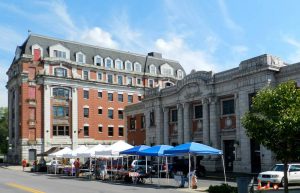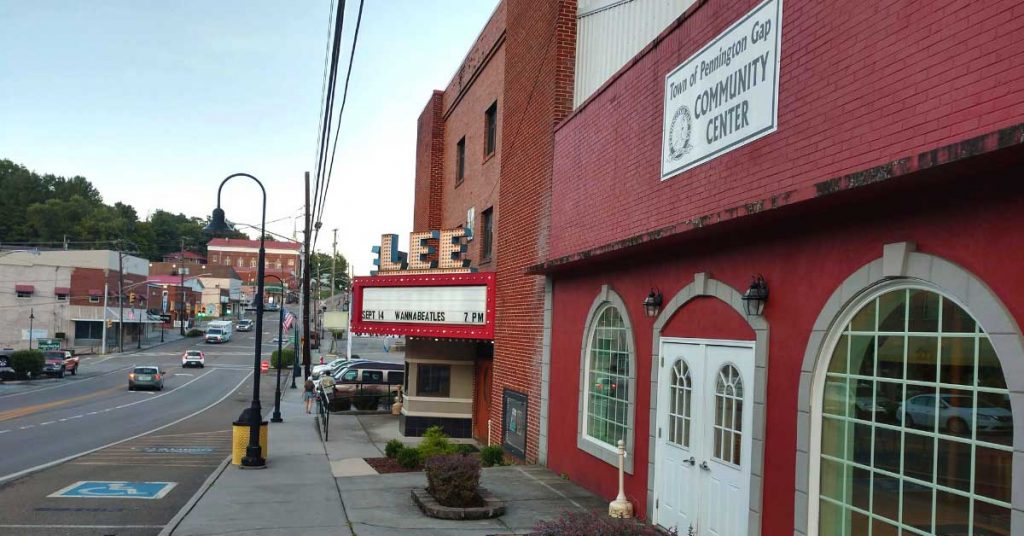An Enterprising Idea

Community members participating in the Grafton, W. Va., Turn This Town Around initiative completed projects such as repainting a downtown caboose and expanding the local farmers market. Photos courtesy of Amanda Yager, WV Community Development Hub
Investing in Appalachia starts with jumpstarting local businesses
By Tom Sexton
From former coal boomtowns and tobacco-dependent counties to areas that haven’t seen a dominant industry in decades, communities throughout Appalachia are finding inventive ways to support new business and add a crucial boost to their local economies.
The Mountain Association for Community Economic Development was one of the earliest supporters of Appalachian entrepreneurship. Since its inception in 1976 in Berea, Ky., MACED has reinvested hundreds of thousands of dollars received from grant funders, investors and individual donors into burgeoning central Appalachian enterprises.
In the past few years alone, MACED has given financial backing to ventures as diverse as up-and-coming country music artist Tyler Stephens, the Beaver Creek Veterinary Hospital which serves the pets of low-income families, and Good Shepherd Farms, which started making sheep cheese on a repurposed tobacco farm in Bath County, Ky.
Most recently, MACED ventured outside the Bluegrass State by collaborating with Natural Capital Investment Fund of West Virginia to make a $300,000 loan to River Expeditions, the brainchild of Rick and Heather Johnson of Lansing, W.Va. The couple used the funds to start an outdoor adventure business that employs 11 full-time staff with 200 seasonal employees.
While groups like MACED specialize in directly supporting Appalachian businesses, other projects, such as Appalachian Ventures, an initiative of the Appalachian Prosperity Project, specialize in educating entrepreneurs to give them the tools to ensure their long-term success in business.
Appalachian Ventures gives entrepreneurs access to abbreviated versions of the highly-ranked management program at the University of Virginia’s Darden Business School. Appalachian Ventures is currently trying to encourage start-up opportunities in southwest Virginia by utilizing the area’s natural resources, most notably the Clinch River, which is already a destination for adventure tourism in the area, and is noted by the initiative as one of the world’s most biologically diverse rivers.
At the municipal level, Appalachian cities are starting to provide incentives to create entrepreneur-friendly environments. In Whitesburg, Ky., a regional hub for the arts and media, the city helps entrepreneurs find and negotiate competitive rents with the owners of empty retail spaces, and even goes so far as to waive the annual occupational licensing fees for new businesses inside the city limits. In the last year alone, Whitesburg has introduced a record store, a bakery, a moonshine distillery, a hydroponics shop and an extremely successful farmer’s market, which will include more than 70 vendors from in and around the area selling their products this summer — nearly ten times the number from the previous year.
One vendor, Chris Caudill, who specializes in corn and pumpkins, estimates that he’ll generate $30,000 in sales this year at the market, which he hopes to put toward opening a grist mill.
“My vision is to have an old-timey operation with the big wheel that rotates in the river,” says Caudill. “I want to do tours and show people how cornmeal was made many years ago, and sell them cornmeal made in that way, right there at the mill.”
Urban centers in Appalachia are taking it one step further and investing in infrastructure to encourage new business.
Chattanooga, Tenn., of all the urban centers in the region, has best positioned itself as an attractive destination for entrepreneurs. The city invested in a fiber optic grid and offered reasonably priced access to lure modern entrepreneurs with some of the fastest internet speeds in the country. So successful is Chattanooga’s big bet on fast internet, that it prompted Google to copy the city’s model with their Fiber program, which offers Gigabit internet and television access in select U.S. cities.
Given the progress that the forward-thinking people, municipalities and organizations in the region are making — and the examples they are setting — it seems that they may just be on to something.
Related Articles
Latest News

Leave a comment
Your email address will not be published. Required fields are marked *




